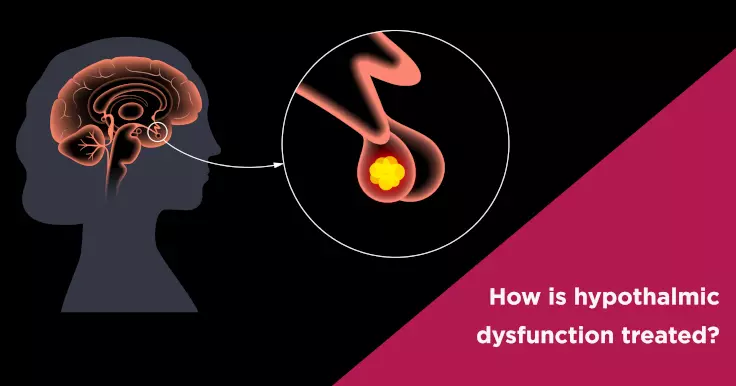How Hypothalamic Dysfunction Is Treated?

The size of an organ may not necessarily be in direct proportion to the importance of its role. The hypothalamus is a small part of the brain that plays a large role in regulating body functions and the functioning of other organs such as the pituitary gland.
Hypothalamic dysfunction refers to a condition where the hypothalamus does not produce adequate hormones. This, in turn, can cause many issues such as weight changes, loss of sex drive, changes in body clock and emotions, difficulty regulating body temperature and even infertility.
Diagnosing Hypothalamic Dysfunction
Advancements in medical science have made it easier to diagnose conditions like hypothalamic dysfunction. The first step to such a diagnosis is a thorough medical examination. Some of the tests that may be used to help confirm a diagnosis are:
- Blood and Urine tests to check
- Cortisol levels
- Estrogen levels
- Growth hormone levels
- Pituitary hormone levels
- Prolactin levels
- Testosterone levels
- Thyroid functioning
- Sodium levels
- Osmolality
- Timed blood samples after hormone injections
- MRI of the brain
- CT scan of the brain
- Visual field eye exam if a tumour is suspecte
Treatment for Hypothalamic Dysfunction
There are many ways hypothalamic dysfunction can be treated. The best form of treatment depends on the factors triggering it. Thus, along with confirming a diagnosis, doctors will also need to identify the factors causing this condition. Some of the common causes of hypothalamic dysfunction are:
- Genetic disorders
- Birth defects
- Eating disorders
- Tumours
- Infections
- Autoimmune diseases
- Exposure to radiation
In some cases, a clear cause may be unidentifiable. This is known as idiopathic hypothalamic dysfunction. Till date, there has been no successful treatment identified for such cases. In most other cases, treatment takes the form of surgery, radiation or hormone supplements.
Surgery and Radiation
Surgery and radiation are usually recommended in cases where hypothalamic dysfunction is caused by tumours. These tumours may put pressure on the hypothalamus and reduce its functioning. Common symptoms of hypothalamic dysfunction caused by tumours include:
- Loss of vision
- Frequent headaches
In the case of small isolated tumours, surgery may be the first course of treatment. This is aimed at removing the tumour in its entirety. Surgery may be followed by radiation to ensure that the tumour does not recur. However, in the case of larger tumours, radiation may first be given to shrink the tumour before it can be surgically removed.
Hormone Supplements
This condition keeps the thyroid gland and adrenal glands from producing essential hormones. In such cases, hormonal supplements may be prescribed to replace the missing hormones. In such cases, it is important to follow the doctor's prescription strictly. Hormone supplements may be administered orally or through injections. In either case, the dosage must not be changed without consulting the doctor.
In addition to this, leading a healthier lifestyle can also help improve the functioning of the hypothalamus. Eating good fats such as olive oil can improve hormone synthesis. Regular exercise and getting adequate sleep can also prove to be beneficial.
 Infertility Counselling
Infertility Counselling Female Infertility Treatment
Female Infertility Treatment Andrology Treatment
Andrology Treatment Fertility Enhancing Surgeries - Female
Fertility Enhancing Surgeries - Female Fertility Enhancing Surgeries - Male
Fertility Enhancing Surgeries - Male Endoscopy Treatment
Endoscopy Treatment IUI Treatment
IUI Treatment IVF Treatment
IVF Treatment ICSI Treatment
ICSI Treatment Advanced IVF Solutions
Advanced IVF Solutions Embryology
Embryology Vitrification Egg, Embryo, Sperm Freezing
Vitrification Egg, Embryo, Sperm Freezing Preimplantation Genetic Testing (PGT)
Preimplantation Genetic Testing (PGT) Donation Program Embryo / Egg / Sperm
Donation Program Embryo / Egg / Sperm Self-cycleTM IVF
Self-cycleTM IVF

 Self-cycleTM IVF
Self-cycleTM IVF










